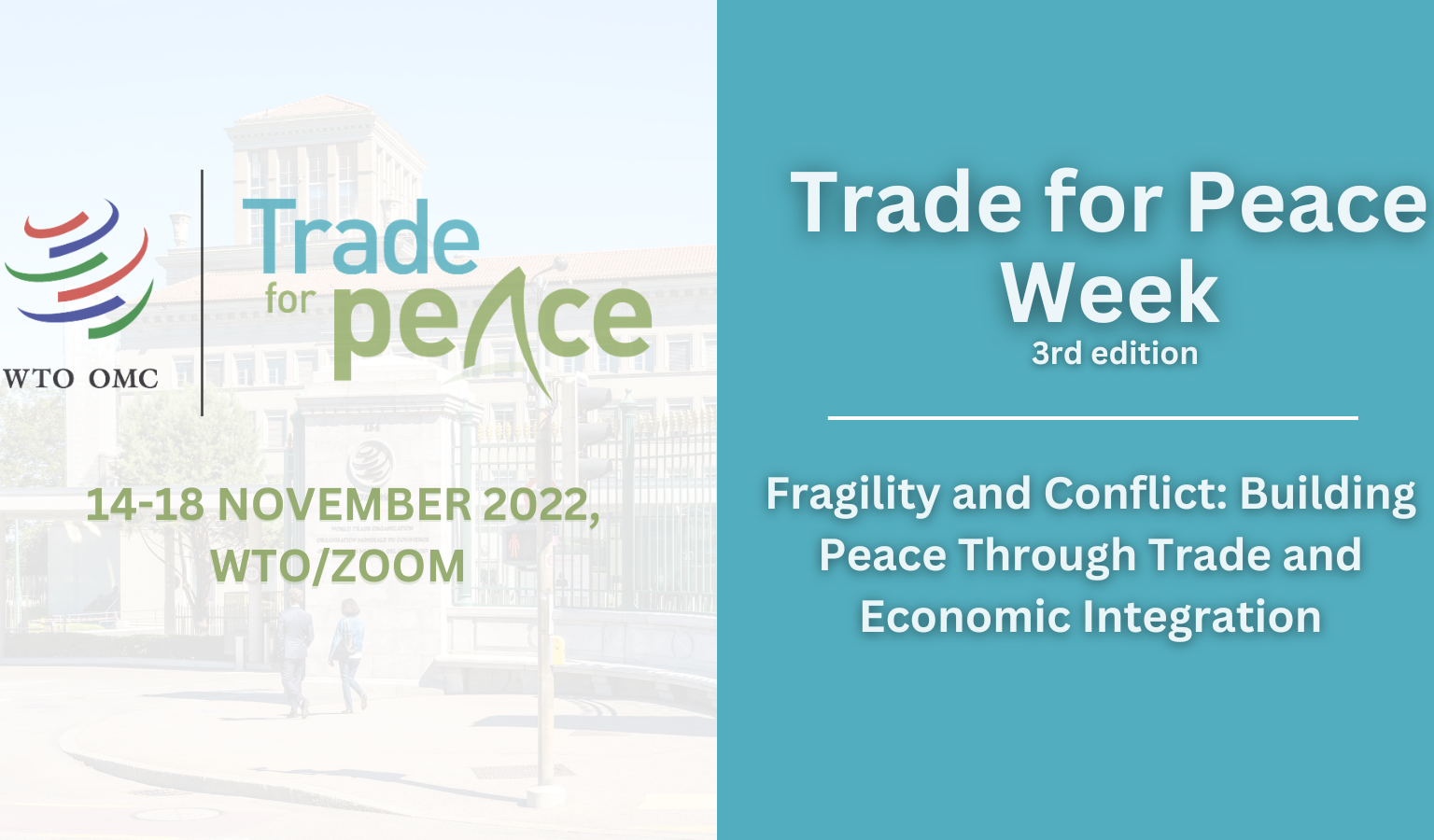
accessions
3rd edition of the Trade For Peace Week
Fragility and conflict: building peace through trade and economic integration
Hybrid: Zoom/WTO, Geneva 14-18/11/22
Background
The Trade for Peace (T4P) Programme has grown out of the vision of the g7+ WTO Accessions Group which consists of fragile and conflicted affected states (FCS) associated with accession. Launched at the 11th WTO Ministerial Conference in 2017, the Group's goal is to facilitate the integration of FCS into the multilateral trading system through WTO membership which aims at strengthening economic and trade policy frameworks and institutions, and promoting transparency and good governance. To support the Group's vision and work, the WTO Secretariat has organised various activities first under the “Trade for Peace through WTO Accession” Initiative, which was then expanded into the T4P Programme in 2021 for all FCS in the WTO.
The T4P Programme focuses on the role of trade and economic integration as a pillar in the promotion of durable peace and stability in countries which have been affected by fragility and conflict. The Programme calls for closer collaboration between the trade, peace, and humanitarian communities, creating opportunities for creative and interdisciplinary approaches to leverage the multilateral trading system for peace and stability. Activities organised under the Programme, implemented through four pillars, are aimed at exploring and establishing greater understanding on the relationship between trade and peace and more in particular, how trade can contribute positively to the attainment of peace and stability in FCS.
It should be noted that the T4P Programme has highlighted, for the first time, the needs and challenges of FCS as a systemic issue in the WTO. At the 12th WTO Ministerial Conference held in June 2022, the g7+ WTO Accessions Group has called for the establishment of a WTO Work Programme on T4P for FCS by the 13th Ministerial Conference(1) .
3rd Trade for Peace Week, 14-18 November 2022
The Trade for Peace Week is one of the main outreach activities organised under the T4P Programme. The 1st edition of the T4P Week took place in December 2020, consisting of 10 webinars involving 8 partners. In November 2021, the 2nd edition was organized in partnership with the Government of Kazakhstan, focusing on Trade and Security — Eurasian Perspective.
The thematic focus of the 3rd edition of the Trade for Peace Week is on the concept and issues related the integration and participation of FCS in the WTO. The five-day activity will consist of five 90-minute panel discussions with the following objectives:
- To gain understanding on the definition and concept of FCS, including from various regional and country perspectives;
- To understand trade-related challenges faced by FCS in the participation in the WTO, including in accession; and,
- To discuss how the WTO can better support the integration and participation of FCS in the WTO.
Footnote
- News item: WTO | 2022 News items - g7+ Accessions Group urges WTO to play active role in promoting peace Back to text
MONDAY, 14 NOVEMBER 2022
SESSION 1 — OPENING: MOVING AWAY FROM FRAGILITY AND CONFLICT— BUILDING PEACE THROUGH TRADE AND ECONOMIC INTEGRATION - 13:00 – 14:30 CET, Room S2 / Zoom
Most of the world's poor live in countries and territories affected by fragility or disrupted by conflict (FCS). In addition to taking a huge toll on human life, fragility and conflict have a severe effect on economic activity and infrastructure, constraining development and creating a vicious cycle of destruction and violence. Such countries have been impacted most by the recent global challenges, such as the COVID-19 pandemic and the world economic downturn – which, arguably, contributed to the emergence of new conflicts in the world.
While the role of trade and economic integration in promoting economic development, peace and stability is widely acknowledged, such countries continue to struggle to access international trade tools and integrate into the global economy, which can affect their participation in the WTO. With the aim of supporting these states, the Ministers of the g7+ WTO Accessions Group have recently called on the WTO to play a more active role in promoting peace and to establish a dedicated WTO Work Programme on Trade for Peace for FCS.
This opening session will discuss the specific challenges faced by FCS and tackle the impact of trade on fragility and conflict, as well as investigate the role of trade and economic integration in building peace in FCS.
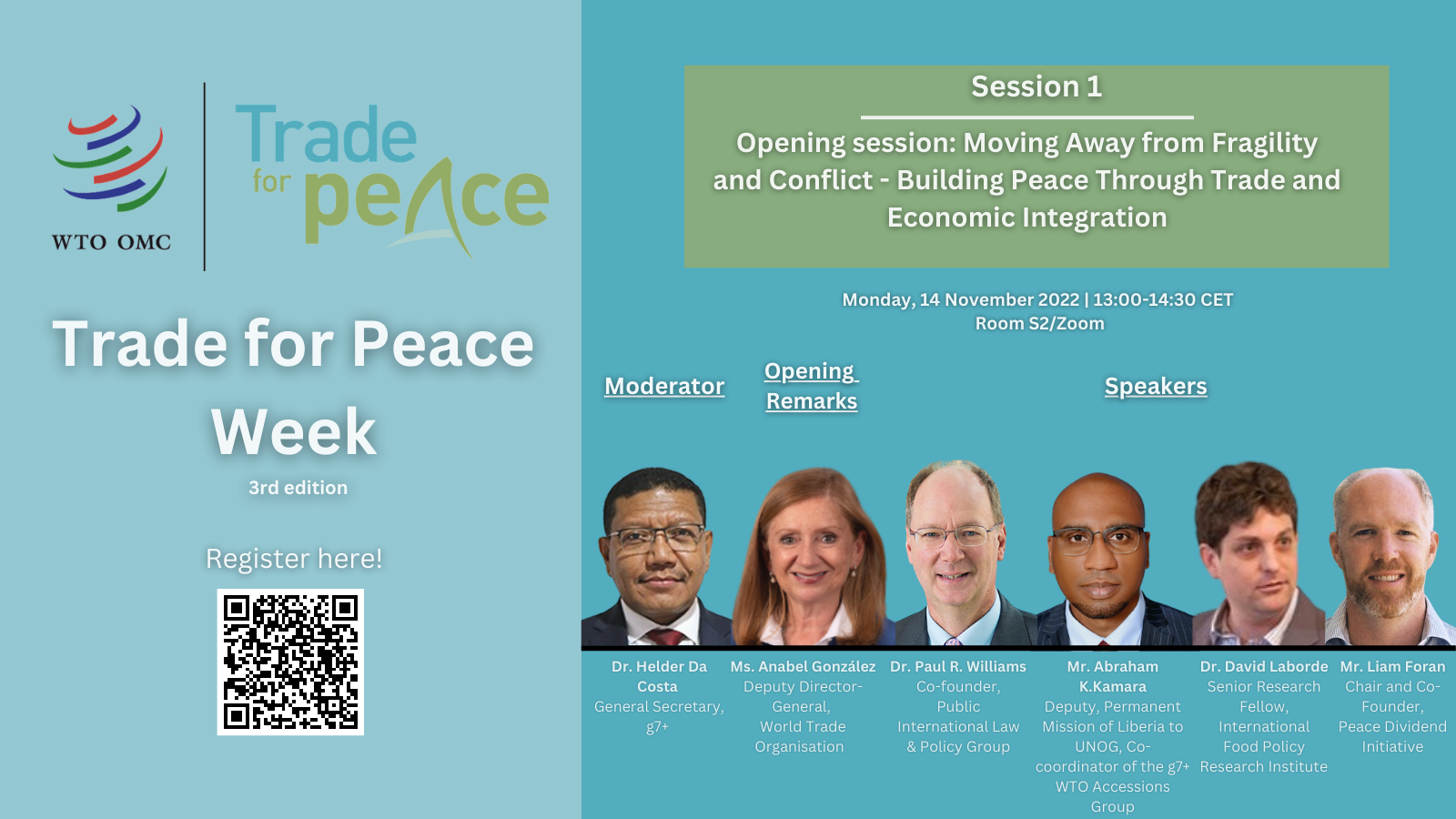
Moderator
Dr. Helder Da Costa
General Secretary, g7+
Opening remarks
Ms. Anabel Gonzalez
Deputy Director-General, World Trade Organization
Speakers
Dr. Paul R. Williams
Co-founder, Public International Law & Policy Group (PILPG) (virtual)
Mr. Abraham K. Kamara
Deputy, Permanent Mission of the Republic of Liberia to the UN and other international organization and Co-coordinator of the g7+ WTO Accessions Group
Statement
Mr. Liam Foran
Chair and Co-Founder, Peace Dividend Initiative (virtual)
Dr. David Laborde
Senior Research Fellow, International Food Policy Research Institute (IFPRI)
TUESDAY, 15 NOVEMBER 2022
SESSION 2 — FRAGILE AND CONFLICT-AFFECTED SITUATIONS: DEFINITIONS, CONCEPTS AND APPROACHES 13:00 – 14:30 CET, Room S2 / Zoom
The concepts of fragility and conflict have increasingly been applied by many international organizations, both at the global and regional level. Fragility and conflict can greatly affect the work of these different international organizations, especially on the way it is carried out and the impact that it has.
The session will allow speakers to explain why these notions must be taken into consideration, before exploring the existing definitions and approaches employed by international organizations, with a focus on their implementation in different contexts and their relevance to the WTO.
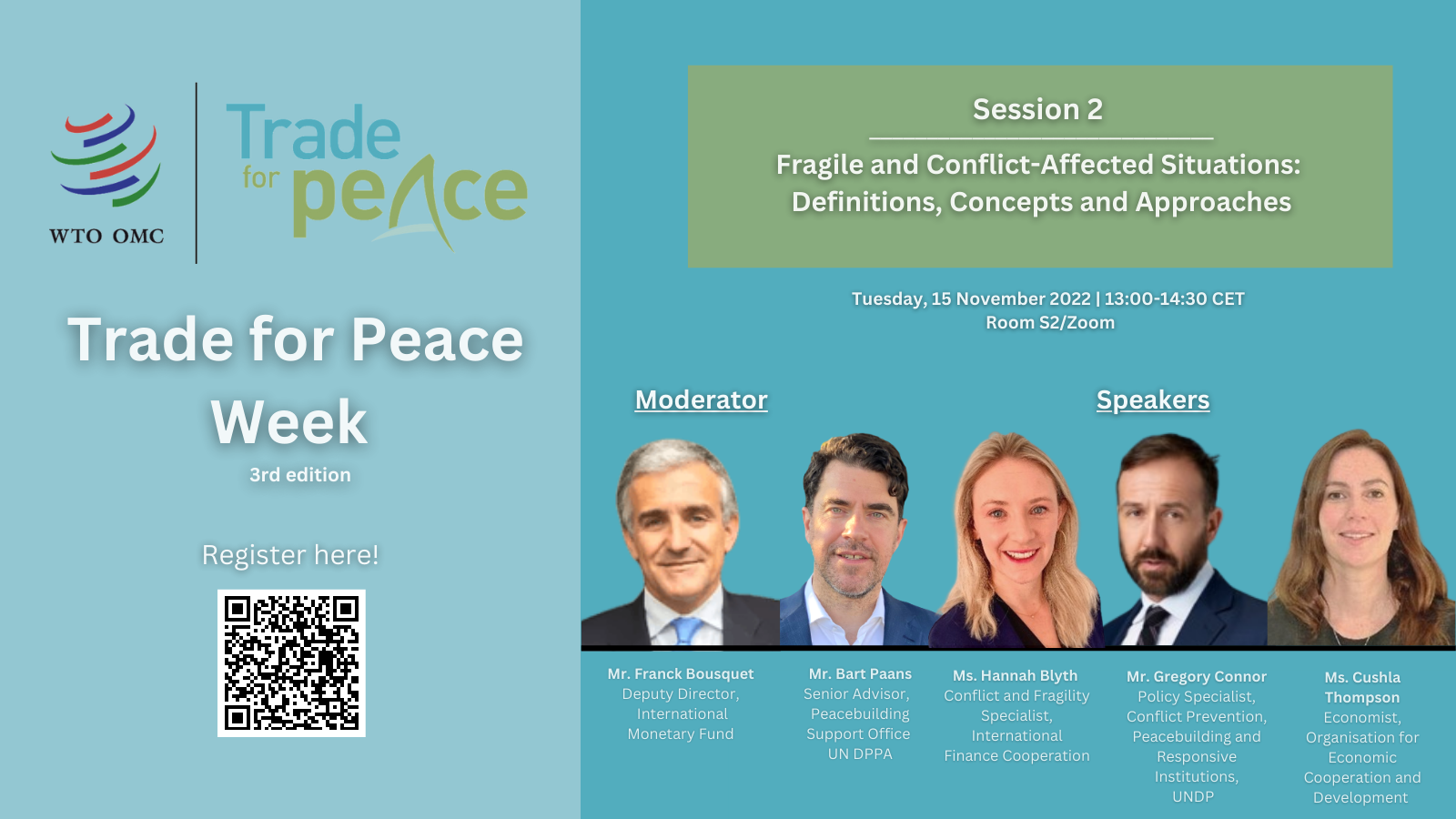
Moderator
Mr. Franck Bousquet
Deputy Director, International Monetary Fund
Speakers
Mr. Bart Paans
Senior Advisor, Peacebuilding Strategy and Partnership Branch, Peacebuilding Support Office, Department of Political and Peacebuilding Affairs, United Nations (virtual)
Ms. Hannah Blyth
Conflict and Fragility Specialist, International Finance Corporation (virtual)
Mr. Gregory Connor
Policy Specialist, Conflict Prevention, Peacebuilding, and Responsive Institutions, United Nations Development Programme (UNDP)
Ms. Cushla Thompson
Economist, Organisation for Economic Cooperation and Development (OECD) (virtual)
WEDNESDAY, 16 NOVEMBER 2022
SESSION 3 — REGIONAL PERSPECTIVES ON FRAGILITY AND CONFLICT, SPECIFIC TRADE-RELATED CHALLENGES AND POSSIBLE WAYS TO ADDRESS THEM IN THE WTO 13:00 - 14:30 CET, Room S2 / Zoom
As of 2022, out of 37 states and territories which are recognized as FCS by the World Bank, 22 are classified as LDCs, 20 are in Africa and nine are in the Arab Region. While each state experiences fragility and conflict differently depending on the intensity and the specific context, some common challenges may appear. The session will highlight various regional perspectives on fragility and conflict, underscoring the particular difficulties that FCS from different regions face, with a focus on specific trade-related challenges and possible solutions which could be offered in the context of the WTO.
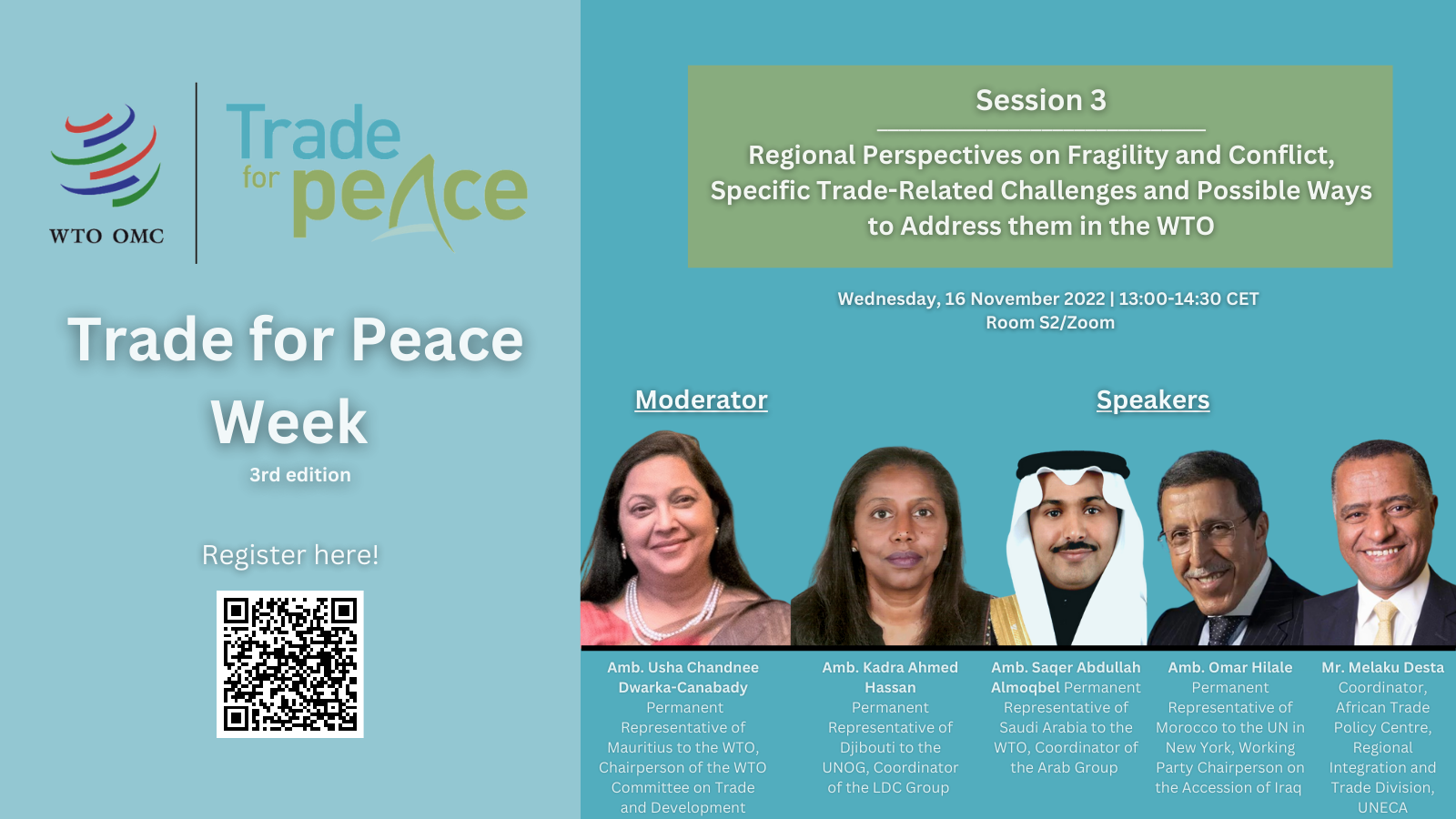
Moderator
Ambassador Usha Chandnee Dwarka-Canabady
Permanent Representative of Mauritius to the WTO, Chairperson of the WTO Committee on Trade and Development
Speakers
H.E. Dr. Francis M. Kai-Kai
Minister of Planning and Economic Development of Sierra Leone and Chair of the g7+ — TBC (virtual)
Ambassador Kadra Ahmed Hassan
Permanent Representative of Djibouti to the UNOG, Coordinator of the LDC Group
Ambassador Saqer Abdullah Almoqbel
Permanent Representative of Saudi Arabia to the WTO, Coordinator of the Arab Group
Ambassador Omar Hilale
Permanent Representative of Morocco to the United Nations in New York and Working Party Chairperson of the Accession of Iraq
Mr. Melaku Desta
Coordinator, African Trade Policy Centre, Regional Integration and Trade Division, UN Economic Commission for Africa (virtual)
THURSDAY, 17 NOVEMBER 2022
SESSION 4 — PROMOTING TRADE FOR PEACE THROUGH WTO ACCESSION: THE CASE OF SOMALIA 13:00 – 14:30 CET, Room S2 / Zoom
This session will discuss Somalia's commitment to implement the necessary economic and trade policy reforms through WTO accession which should serve as a vehicle for social, economic, and institutional transformation in Somalia and create the foundations for sustainable peace.
While the Somali government recognizes the benefits of the country's integration into the multilateral trading system, Somalia's accession to the WTO faces many challenges. This session will address both the challenges and opportunities to advance the WTO accession process and to use economic integration as a key peacebuilding and development tool.
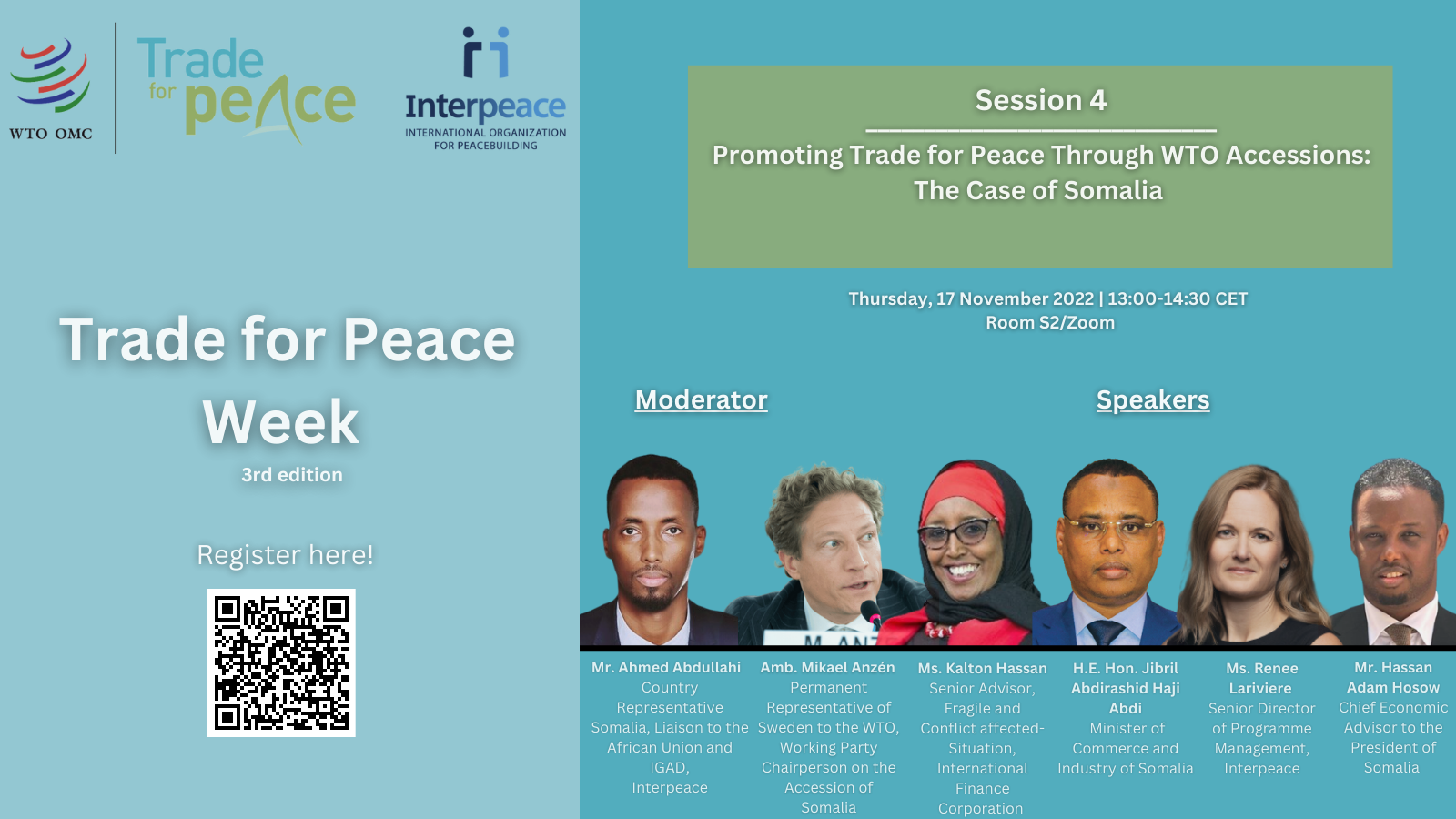
Moderator
Mr. Ahmed Abdullahi
Interpeace Country Representative, Liaison to the African Union and IGAD, Interpeace (virtual)
Speakers
H.E. Hon. Jibril Abdirashid Haji Abdi
Minister of Commerce and Industry, Federal Republic of Somalia
Mr. Hassan Adam Hosow
Chief Economic Advisor to the President of the Federal Republic of Somalia
H.E. Mr. Mikael Anzén
Ambassador and Permanent Representative of Sweden
Ms. Renee Lariviere
Senior Director of Programmes, Interpeace
Ms. Kalton Hassan
Senior Advisor, Fragile and Conflict Affected-Situation, International Finance Corporation (virtual)
FRIDAY, 18 NOVEMBER 2022
SESSION 5 — BECOMING A WTO MEMBER: TRADE FOR PEACE ANGLE — THINKING AHEAD 13:30 – 15:00 CET, Room S1 / Zoom
WTO accession can serve as an anchor for implementing critical structural reforms. By strengthening economic and trade policy frameworks and promoting good governance, acceding governments can use the accession process to tackle challenges associated with conflict and institutional and social fragility. The finalisation of an accession process is a critical point where strategic decisions need to be made with respect to the post-accession implementation of said reforms and effective participation in the WTO, to achieve their long-lasting effects and to promote sustained peace and stability. With the participation of the chief negotiators of Comoros and Timor-Leste, two accessions in “priority focus” which are close to crossing the finish line, as well as Liberia and Afghanistan, the two most recently acceded Members, this session will explore recent best practices and lessons learned at this critical stage, and look for possible ways to better support the integration and participation of FCS in the multilateral trading system.
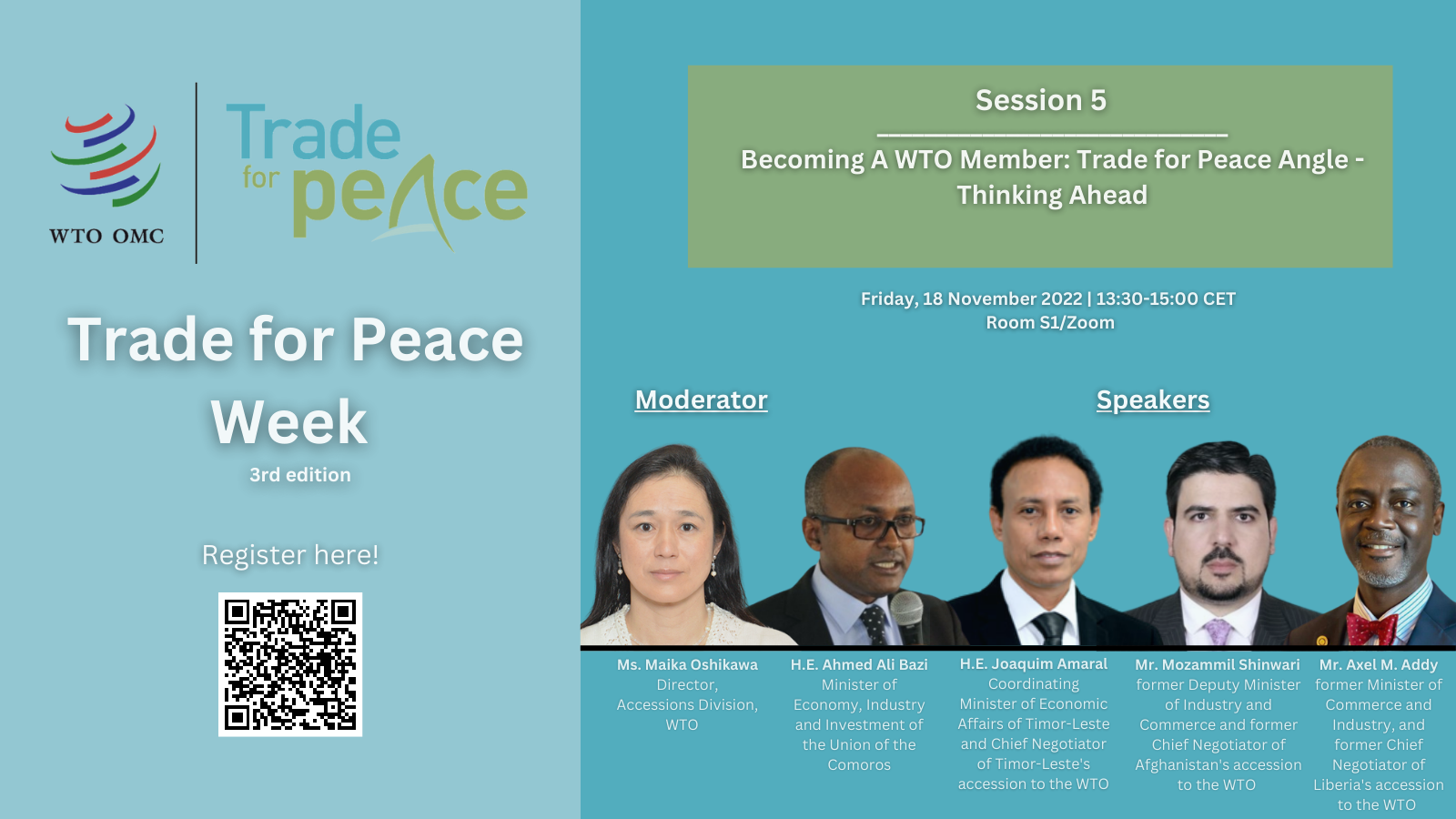
Moderator
Ms. Maika Oshikawa
Director, Accessions Division, WTO
Speakers
H.E. Ahmed Ali Bazi
Minister of Economy, Industry and Investment, Union of the Comoros
H.E. Joaquim Amaral
Coordinating Minister of Economic Affairs of Timor-Leste and Chief Negotiator of Timor-Leste's accession (virtual)
Statement
Mr. Mozammil Shinwari
Former Deputy Minister of Industry and Commerce and former Chief Negotiator of Afghanistan's accession to the WTO (virtual)
Mr. Axel M. Addy
Former Minister of Commerce and Industry, and former Chief Negotiator of Liberia's accession to the WTO — (virtual)
FRIDAY, 18 NOVEMBER 2022
SPECIAL SESSION — YOUTH ENGAGEMENT IN TRADE AND PEACE 16:30 – 17:30 CET, The FAB, IHEID
Youth are among those most affected by conflict, yet least involved in the post-conflict reconstruction process, including negotiations, economic integration and policymaking efforts. Fragile and conflict-affected settings expose youth to various forms of violence, including forced participation in armed conflict, targeted violence, and psychological trauma. They are also the main victims of disruptions to education, employment opportunities and access to social protection.
In light of these challenges, added to the fact that we now have the largest youth population in human history, meaningful youth engagement is key in guaranteeing societal stability and positive economic and security prospects. As a result, the WTO's Trade for Peace (T4P) Programme has launched Future Leaders, an initiative seeking to increase youth engagement on trade and peace by raising awareness on the challenges that fragility and conflict pose for the youth and highlighting the role that young people can play in shaping a more inclusive and peaceful future through trade. At the same time, it is crucial to form the next generation of leaders to think across disciplines to ensure more impactful and sustainable solutions are found to the challenges of the future.
With the presence of young leaders from the trade and peace communities, this special session will explore how young people around the world are affected by conflict and fragility, how the youth can build peace through trade, and how to better include young professionals in the fields of trade and peacebuilding and foster meaningful exchange between the two areas.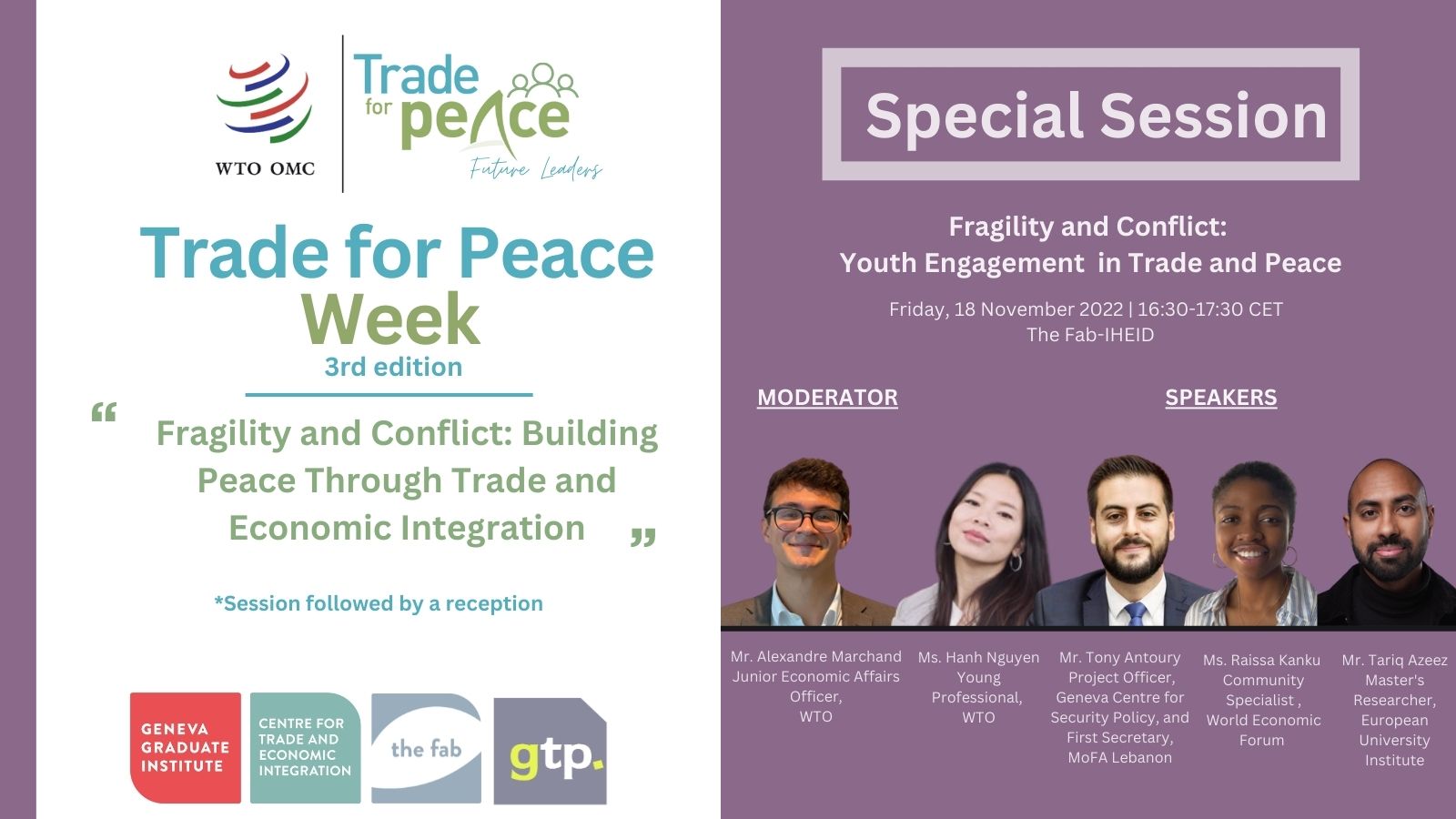
Moderator
Mr. Alexandre Marchand
Junior Economic Affairs Officer, World Trade Organization (WTO)
Speakers
Ms. Hanh Nguyen
Young Professional, Office of the Director General, World Trade Organization (WTO)
Mr. Tony Antoury
First Secretary, Ministry of Foreign Affairs and Emigrants, Lebanese Republic, and Project Officer, Geneva Centre for Security Policy (GCSP)
Ms. Raissa Kanku
Community Specialist, Africa and Operations- Global Shapers Community, World Economic Forum (WEF)
Mr. Tariq Azeez
Master's Researcher, European University Institute, School of Transnational Governance
Share
Problems viewing this page? If so, please contact [email protected] giving details of the operating system and web browser you are using.